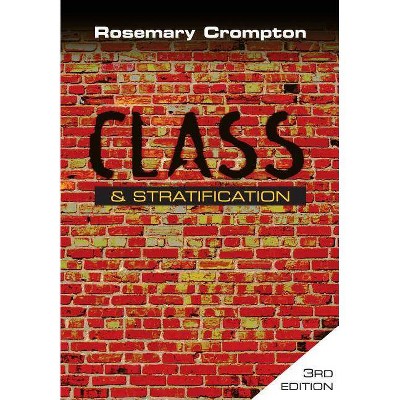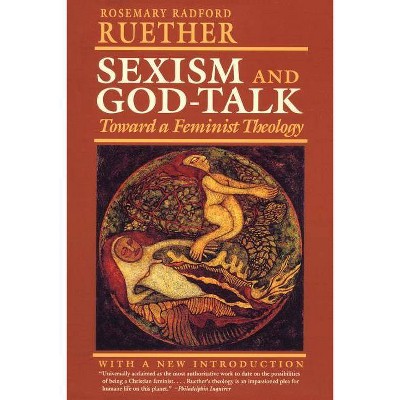Class and Stratification - 3rd Edition by Rosemary Crompton (Paperback)

Similar Products
Products of same category from the store
AllProduct info
<p/><br></br><p><b> Book Synopsis </b></p></br></br>Inequality in its many forms is becoming an ever greater problem in modern society. The revised edition of this popular book explains why it is so important to understand class and stratification, and how the tools used to analyse these divisions can help us to understand and confront problems of inequality. <p>This third edition of <i>Class and Stratification</i> has been extensively revised, expanded and updated, incorporating discussions of contemporary economic and social change. It includes discussions of political and economic neoliberalism and its impacts as well as developments in social theory, such as the emphasis on 'individualization' and the 'cultural turn'. New to this edition is a chapter focusing on 'cultural' approaches to class analysis, which together with established approaches are used to explore new developments in social mobility, educational opportunity, and social polarization.</p> <p>The book will be essential reading for upper-level undergraduate and postgraduate students in the social sciences seeking to understand the changing face of social inequality. By highlighting the damage increasing inequality is causing to the social fabric, the book reveals the important part class continues to play in our lives today.</p><p/><br></br><p><b> From the Back Cover </b></p></br></br>Inequality in its many forms is becoming an ever greater problem in modern society. The revised edition of this popular book explains why it is so important to understand class and stratification, and how the tools used to analyse these divisions can help us to understand and confront problems of inequality. <br /> <p><br /> </p> <p>This third edition of <i>Class and Stratification</i> has been extensively revised, expanded and updated, incorporating discussions of contemporary economic and social change. It includes discussions of political and economic neoliberalism and its impacts as well as developments in social theory, such as the emphasis on 'individualization' and the 'cultural turn'. New to this edition is a chapter focusing on 'cultural' approaches to class analysis, which together with established approaches are used to explore new developments in social mobility, educational opportunity, and social polarization.<br /> </p> <p><br /> </p> <p>The book will be essential reading for upper-level undergraduate and postgraduate students in the social sciences seeking to understand the changing face of social inequality. By highlighting the damage increasing inequality is causing to the social fabric, the book reveals the important part class continues to play in our lives today.</p><p/><br></br><p><b> Review Quotes </b></p></br></br><br>Provides major insights into gender, class and stratification.<br /> <i><b>Equality, Diversity and Inclusion</b></i> <p>The great strength of Crompton's book remains its commitment to providing a rounded analysis of both theoretical and empirical understanding of the continuing importance of class within contemporary society - together with the ability to present this in clear and accessible terms.<br /> <b><i>Journal of Social Policy</i></b></p> <p>A superb new edition from Crompton which will be perfect for students as well as the advanced reader. In new chapters on class and culture and families and mobility, Crompton powerfully demonstrates the importance of class and stratification to sociology as the sub-discipline continues to engage with big issues around structure and agency and economy and culture. Another best seller to be sure.<br /> <b>Fiona Devine, <i>University of Manchester</i></b></p> <p>Rosemary Crompton's <i>Class and Stratification</i> has established itself as the standard source for stratification studies. It combines theoretical rigour with an authoritative overview of relevant and up-to-date research. The third edition has been completely revised to include extended discussions of the impact of Bourdieu in stratification studies and recent work on social mobility and education. It is virtually a new book and will be of immense value even to those who have read its previous versions.<br /> <b>John Scott, <i>University of Essex</i><br /> </b><br /> Once again Rosemary Crompton has produced a brilliant synthesis. This third edition is the only textbook to range across both the traditional sociological debates on class, and the newer currents concerned the role of class in a neo-liberal environment. The overview of the extensive work influenced by Pierre Bourdieu is especially valuable. <b>Mike Savage, <i>University of Manchester</i></b></p> <p>Acclaim for previous edition: </p> <p>A comprehensive and compelling account of central debates on class and stratification. It is a brave and successful attempt to make accessible the many debates which are conducted under the banner of social class.<br /> <b><i>Times Higher Education Supplement</i></b></p> <p>Rosemary Crompton's book is by far the best existing guide to the present state of class analysis, remarkably well informed about the details of the most important current controversies.<br /> <b><i>Work, Employment and Society</i></b></p> <p>A timely review of sociology's contribution to the explanation of social inequality. This book does an excellent job of setting out for students the central features of class analysis and its contribution to the study of inequality covering where it has been, where it is now, and where it might be going. It does so in an engaging manner and with a concern to recover a sense of meaning and purpose for both the insiders and outsiders of stratification analysis. It is bound to become a basic test for teaching in this area.<br /> <b><i>Sociology</i></b></p><br><p/><br></br><p><b> About the Author </b></p></br></br><b>Rosemary Crompton </b>is Professor of Sociology at City University, London.
Price History
Price Archive shows prices from various stores, lets you see history and find the cheapest. There is no actual sale on the website. For all support, inquiry and suggestion messagescommunication@pricearchive.us




















